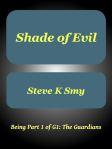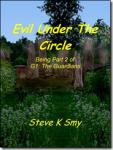 If somebody had told me, just a few short months ago, that most of my writing efforts would be pointed anywhere near the horror genre, I would likely have dropped dead from a fatal episode of hysterical laughter! Fair enough, as a kid, and even as a youth, I dabbled with reading the genre, but they were true horror classics. Well, maybe not classics, except my one reading of Dracula, but classic in the sense of content. There was lots of carefully constructed tension and very little, if any, actual gore. They were, I suppose, what could be termed ‘psycho-emotional horror’, working on the shadowy corners and dark places of our primitive mind. Those authors didn’t, then, feel the need to compete with the gory, in-your-face, leave-nothing-to-the-imagination bloodbaths churned out by Hollywood (and others). Many were writing when there were still directors, producers and screenplay writers who saw the value in creeping you out – not trying to gross you out! Subtle horror movies are now very rare, and the same is also true with books.
If somebody had told me, just a few short months ago, that most of my writing efforts would be pointed anywhere near the horror genre, I would likely have dropped dead from a fatal episode of hysterical laughter! Fair enough, as a kid, and even as a youth, I dabbled with reading the genre, but they were true horror classics. Well, maybe not classics, except my one reading of Dracula, but classic in the sense of content. There was lots of carefully constructed tension and very little, if any, actual gore. They were, I suppose, what could be termed ‘psycho-emotional horror’, working on the shadowy corners and dark places of our primitive mind. Those authors didn’t, then, feel the need to compete with the gory, in-your-face, leave-nothing-to-the-imagination bloodbaths churned out by Hollywood (and others). Many were writing when there were still directors, producers and screenplay writers who saw the value in creeping you out – not trying to gross you out! Subtle horror movies are now very rare, and the same is also true with books.
Don’t get me wrong! Horror isn’t the only victim of ‘bloodbath fixation’. Thrillers, crime stories, and other genres have suffered, too. One thing I enjoyed about reading Chris Allen’s excellent novel Hunter was the fact that action sequences didn’t devolve into mass shootouts with bodies dropping every few microseconds and people being torn asunder, graphically, by a variety of explosive devices. The action was real, sometimes brutal (violence can’t, after all, be anything else!), but never excessive and most certainly not the reason for the book! The action was a fundamental necessity of an excellent story, but only because such violence is a natural part of the world portrayed. The world wasn’t reinvented to allow violence to be the dominant characteristic.

Anyway, back to the fact that I seem to have become hooked on what is, essentially, the horror genre. The appearance of a character interview with one of the ‘stars’ of the books is evidence of that fact. It actually started as an experiment, and one that I deliberately wanted to keep as far away from the flood of Vampire tales as possible. That first tale, Shade of Evil, reached an unexpected conclusion and introduced a group I didn’t even know existed when I started! In fact, after that first tale, I initially had no plans to pursue it. Then a tiny idea popped into my head. This time, though it still wasn’t to be immediately obvious, the mysterious group would be a key element, and one or two of the characters in their number started to take on real personalities. I didn’t know their histories, but I knew more


Like most people, I’ve subjected myself, during a lengthy period of semi-vegetative existence, to the Soap Opera! I can’t say, now, that it was entirely wasted time. Like the vast majority of authors, I’m a people-watcher. I never just see a person. I analyse them, digging into their minds, their emotions. In fact, ‘digging’ is a good word. It’s like people are mines, containing precious elements,and the author is a miner, delving deep down to extract those treasures. What’s that got to do with writing horror? Well, in truth, it relates to all writing! Yet I have never before used the treasures I mined quite as wholeheartedly as I am now. Some genres of fiction let you get away with superficial characters, to some degree. Placing them in situations which elicit strong emotional and psychological reactions, however, as in horror, you have to have stronger, more real characters, with the correct human responses. And you can’t have everything pleasant outside of the danger periods. You have to admit the friction always found between those who exist in a tight knit group. In essence, a horror-based Soap Opera.
I know that I’ve gone on, rather, in this post, but I’m nearly done now. I want to close this post out by saying that I would never have discovered the deeper characterisations and the often mixed and confusing interplay of characters if I had continued to plod along writing those things I was most comfortable with! By risking the experiment, I have discovered something not only about characters, but about myself, and some of my deficiencies as a writer in those more comfortable genres. That’s why I’m hooked on the G1: The Guardians series. It’s a Soap Opera I control (sort of), but it’s also much more. I owe G1 a great debt. I only hope that I can repay it in the tales to come.
~ Steve
52.057772 1.143786
